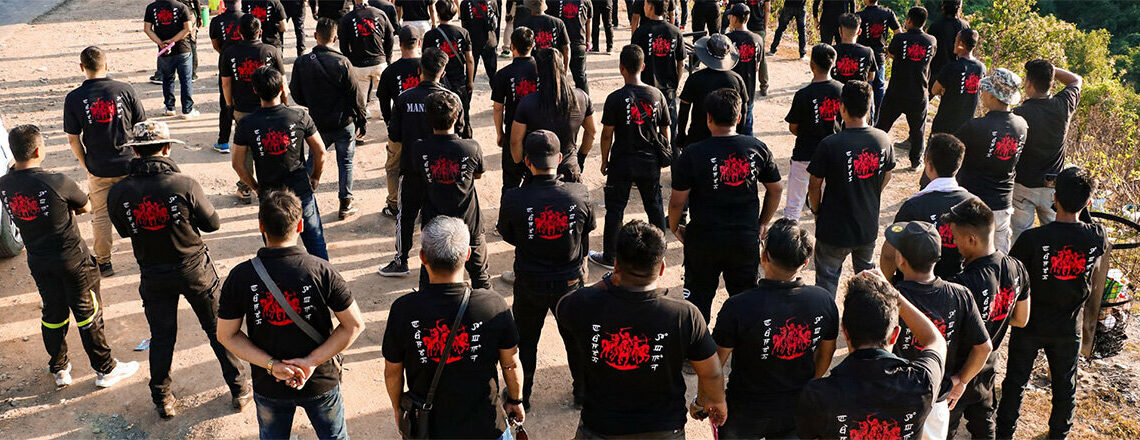The last eight months have witnessed grave travesty of justice in Manipur. Homes have been uprooted, countless lives have been lost and women’s modesty has been outraged. The charred remains of the day are on the brink of complete ruin, as if all will soon be lost.
The adhoc manner in which normalcy is being sought to be restored in the state is bewildering. Even as the ethnic chasm deepens, the most disturbing aspect pertains to the way the state, of late, has abdicated its responsibility to a radical outfit, the Arombai Tenggol. These “dart welding horsemen” of yore have anointed themselves as the protectors of Meitei supremacy.
On 24 January, the group’s leader, Kourounganba Khuman summoned 37 Valley-based legislators and two MPs and coerced them to take an oath in front of Manipur’s primordial deity Pakhangba to “protect Manipur”.
While it is not altogether a new phenomenon in the North East (AASU and ULFA have exhibited such vigilantism during their heday), the sort of chastisement that Valley Manipur is witnessing is disturbing.
Observers would agree that some of the demands that the elected representatives have been pressured to “convey” to New Delhi including the institution of a National Register of Citizens (NRC) in Manipur and the fencing of the border with Myanmar are perfectly valid.
But aspects such as the replacement of the Assam Rifles, abrogation of the Suspension of Operations (SoO) with Kuki militants and removal of “illegal Kuki immigrants” from the ST list are fraught with danger.
The fact that the Kangla Fort episode took place close on the heels of a three-member Government of India team visiting Imphal is even more disconcerting.
The SoO with Kuki militants was formalised on 22 August 2008 after due process by the MHA. The events of 3 May 2023 have led to wanton violence between the Meiteis and the Kukis.
The SoO mechanism may be faulted for a number of reasons including the fact that arms which are now being used against the Meitei community and sundry security forces were permitted to be retained.
But it is also true that organisation’s such as Arombai Tenggol and Meitei miscreants had also looted Police armouries after 3 May 2023 without let and hindrance. Indeed, these are the very weapons that are being used to threaten, maim and kill.
A dialogue process, if it leads to cessation of violence by even minimal degrees is desirable. New Delhi should not, therefore, even countenance the abrogation of a state of affairs that has withstood 15 long years.
If aspects have gone sour as a result of the ethnic conflict, then rearguard action including stringent enforcement of the SoO ground rules should be accorded priority. High wisdom must never undo a process that has been smelted by time, especially as negotiations, labour and bridge-building have gone into constructing such an arrangement. Course correction and not severance should guide prudence and the rule of law.
By the same token, the removal of illegal migrants among the Kuki population has to be carefully adjudicated. After all, if there are “New Kukis” such as Thadous in Manipur which is the second largest social formation in the state, there are also Meiteis who are Christians.
It would, therefore, not be correct to take a simplistic view of matters that are hidden in the mist of yet undiscovered history. In any event, if an NRC exercise with 1951 as the cut-off date is undertaken as demanded, then the question of illegal migration would be automatically addressed.
As for the call for the replacement of the Assam Rifles from the Valley, it is preposterous.
If the Arombai Tenggol feels that the Assam Rifles is being partisan and is consequently seeking its removal, then it is quite clearly because of the firm manner in which it has acted against Valley Based Insurgent Groups which are largely from the Meitei denominations.
But it is a known fact that the Assam Rifles has also decisively acted against Kuki militants. Derision of a force raised as the Cachar Levy way back in 1835 and one which has been hailed as the “Sentinels of the North East” is unfair.
It is a sad commentary for a Republic which steps into its 75th year that a section of its population is seeking the removal of a noble force that has striven and sacrificed so much for Manipur.
Radicalisation of the hue that Arombai Tenggol represents must not go unwatched.
(Jaideep Saikia is an internationally acclaimed Conflict Theorist and Bestselling Author)















